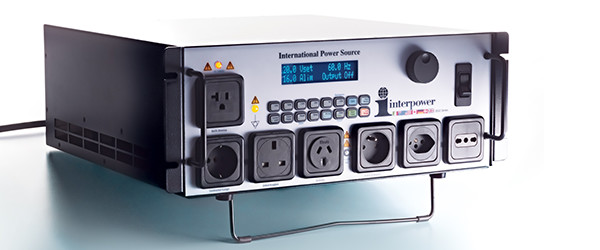The Importance of Advance Testing

Designing, building, and maintaining products for worldwide markets can help to enhance a company’s success. During product development and prior to shipment, it’s essential to know if that product will function properly in the country it is intended to be used in—which makes product testing crucial.
With numerous plug patterns used around the world, engineers and designers need to verify that equipment and consumer electrical products will run safely and reliably on specific voltages and frequencies—before exporting. This makes testing during product development and prior to shipment very important.
Advantages to Testing Products in Advance
There are several advantages to testing products in advance. “Customers today expect to unpack and use the product immediately, so knowing the product will operate at the customer’s input voltage and frequency before shipment is crucial,” explained Jana Brown-Watts, Quality Assurance Coordinator at Interpower. “If the product is running on the incorrect voltage or frequency, it will not be running at its full potential. Using an AC power source to test before export allows for simulation of field conditions on final production models. Fluctuations in the frequency and voltage can be simulated, with voltage tolerances of ±10% and frequency tolerances of ±3Hz.”
By testing during the design phase, it can help to ensure the product will perform correctly and may help to prevent potentially expensive modifications after the end product is in production. “When a product is being built to operate in overseas markets, testing allows you to have control over the construction of the product and not have to rely on a third party modifying it for local use. By manufacturing the product to the customer’s specifications in-house, it will reduce the chance of faulty modifications by the end customer and further reduce the product liability exposure,” she said.
Testing with an AC power source can offer low cost sources of power at various voltages and frequencies found around the world. “These units are often used for technical work and allow precision control of the AC voltage, currency, and frequency,” she said.
IPS (International Power Source)
At Interpower, the IPS (International Power Source) is an AC power source that provides the kind of testing that can assist companies wanting to export. “The IPS provides a clean, convenient source of AC power for product design and product testing at the various voltages and frequencies found around the world,” explained Dan Beeler, Interpower IPS Technician. “The IPS has seven of the most common country-specific sockets. This allows the equipment being tested to use the proper plug.”
Interpower offers several IPS models, which can be purchased or rented. There is also an interface software package which extends the capabilities of the IPS by letting the user create programmable routines.
Who Can Benefit From Using an IPS? Consider These Questions:
- Does your company manufacture, export, or test AC-powered electronic or electrical equipment?
- Where does your company export to?
- What power (voltage/current) rating is the equipment?
- What phase is the equipment? (Note: The Interpower IPS can only test single-phase.)
Additional Resources
For more information on testing, see the International Power Source and the IPS Featured Product page.
Interpower offers free technical support. For further assistance, please see Interpower’s contact information below.






